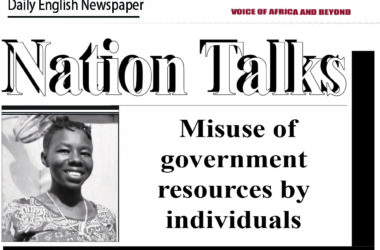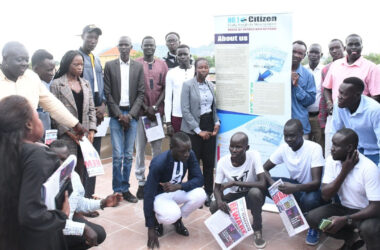By Malek Arol Dhieu
The historians authoring the history of South Sudan with pens are liars, because the history is so dismayful that it can be best written with tears. I know you don’t care about the poor whom this article refers to also as the needy, but take a walk one day in any of the residential areas, you will realize that this beloved country, bought with millions of lives, belongs to few people. There are thousands of unfenced houses while houses of leaders are fenced three times, that’s to say, there is a wall fence, there is an electrified fence on top of a wall fence and there is a human fence armed with weapons.
There are millions of jobless people in the streets of Juba who waste the little money they have for photocopying, printing and scanning of their documents in search for jobs, but all in vain as the system of employment is infected with tribalism and corruption. There are millions of wars and flood IDPs whose lives mainly depend on the government and individual philanthropists to provide their basic needs, and finally, there are millions of people in the grassroots level chained down by hunger and poverty. Why do I mention all these groups of people? I mention them because they are the needy.
If a pie chart is to be graphed to represent the proportions of the needy and the givers, then the segment of the givers would be 50-fold smaller than the segment of the needy. It is to be also noted with vigilance that half a number of the needy is suffering in a dignified silence, I mean there are people who pretend to be well when they are not well. The poor people who queue along the roads or in the streets to beg for livings are even fewer than the poor people whose starving dignities confine them at homes not to go out to stretch their hands for survivals. How does the history value someone who has a protruded belly when his/her neighbour is too emaciated dying of hunger?
Which frequently used Bible verse apart from ‘love your neighbour as you love yourself’ do you remember most? It is too untraditional to get satisfied and your neighbour sleeps hungry. Culturally, a typical man/woman checks on his/her neighbours and his/her neighbours check on him/her so as to ascertain whether or not survival is at ease, and that, if one house lacks what to eat, another house that has what to eat helps it and vice versa. That is not the case with South Sudan, I don’t know whether it is unfortunate or fortunate to say that, in South Sudan, a neighbour may slaughter a cow/goat and eat it alone without inviting another neighbour; something that never happens in traditional settings.
Another tragedy often occurs to the poor people who are neighbours to the rich people, instead of shouldering them to the day their black days get over, they are finished by detaining leftovers to rot and throw them away. Nobody cares for the poor people at all, even just morning greetings aren’t given to them for the fear that they might reply them with beggaries. Dear people who have what to give, not only material alone that nourishes the poor person, but a good care also does. Caring for the needy lessens their suffering because they feel wanted.
Dear poor people, wipe away tears from your already sunken eyes and take it from me that the world is rotational, people who have no what to eat today may have what to eat tomorrow and the reverse is true. The only dismay is that, it’s not poverty alone that has struck South Sudanese to walk counting their fingers in such a way that one may conclude they are going mad soon, but natural disasters are also playing a detrimental role. Hunger is competing with war in reducing the population of South Sudan. I wish there were hungerology in our universities to study because more South Sudanese are dying of hunger than of diseases. Woe to hunger! And shame on the government and the companies responsible for the provision of food.
I know many people will tell me “Why not agriculture instead of hungerology”, but hunger must be prevented and cured like a disease. Agriculturalists would produce foods and when foods become scarce and hunger strikes, I, the only hungerologist, would jump in to provide treatment and care for the hungered. The needy are more than the givers because the givers impoverish people knowingly so that people wrestle with survival instead of wrestling with them for leadership. However, few your possessions are, please share them with the needy.
The author is a medical student, University of Juba. He can be reached at malengaroldit@gmail.com or +211922332811.



